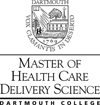In this first installment of a week-long series, Dartmouth Now features stories from the
master’s program at the Dartmouth Center for Health Care Delivery Science. The program, which welcomed its first class of students in July 2011, is committed to the value-based improvement of health care delivery—achieving better outcomes for the same or lower costs—that is scientifically, ethically, and managerially sound. The partnership between The Dartmouth Institute’s advanced research expertise in health care outcomes and the Tuck School of Business’s proven success in teaching leadership and teamwork, finance, and operations combine to create an unmatched educational opportunity.
By Susan J. Boutwell and Kirk Cassels
More than three years ago, Bonni Curran visited Dartmouth for Parents’ Weekend with her daughter Cody Curran ’12. While on campus she heard President Jim Yong Kim speak about a new master’s degree program in health care delivery science, which at that time he was just getting off the ground. The combination of business, public policy, and medicine was just the educational mix that Curran—a physician, writer, and international health volunteer—had been searching for.
Curran had recently returned from Uganda, where she had been volunteering in a hospital, and decided she needed to find a graduate program that would help her figure out how the knowledge she was gaining in the developing world could be shared with medical professionals back home.
The Ketchum, Idaho, resident is now finding her answers as a member of the inaugural Health Care Delivery Science class.
“There are very, very few things in life that exceed your expectation, and this program,” says Curran, is one of those rare experiences. “It’s been amazing. It’s not just the professors, who are incredible, but it’s the people that are in the program and the constant give-and-take that goes on every day, whether I’m in Cambodia, or Liberia, or in Ketchum. It continually stimulates me to think bigger, but bigger in a way that’s approachable and doable.”
Curran, and her physician husband Peter Curran, are among the 46 accomplished, mid-career professionals who are now six months into the 18-month program. The students, who each have an average of 23 years’ experience in health care, are taking classes designed by faculties of The Dartmouth Institute for Health Policy and Clinical Practice and the Tuck School of Business at Dartmouth. Professor Rob Shumsky, featured in the video below, is one of the Tuck professors in the program.
The program includes four brief residential sessions of intensive learning on campus, and approximately 15 hours of distance learning per week, during which students participate in online discussions, lectures, complete group assignments, and take part in weekly faculty-led videoconferences.
Participants in the program hail from 17 U.S. states, as well as from India and France; 85 percent of them already have advanced degrees. Almost 65 percent are physicians and nurses who work on the front lines of health care—in hospitals, health systems, and clinics—in small private practices and large medical centers, in rural settings and inner-cities. Others come from affiliated industries that are critical to efforts to transform health care—insurance companies, medical schools, charitable foundations, and state governments.
“Dartmouth is creating a new kind of health care professional,” says President Kim. “The students in this program can think across many disciplines and are together learning how they can transform the way health care is delivered.”
This week, five participants in the program will talk about what they’re learning, and why it matters. Watch for their stories, previewed in the video below.
